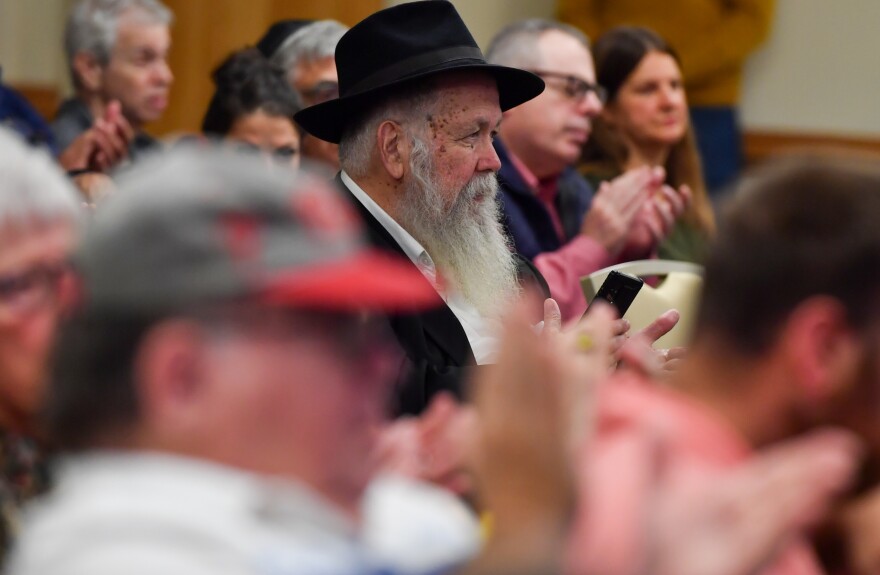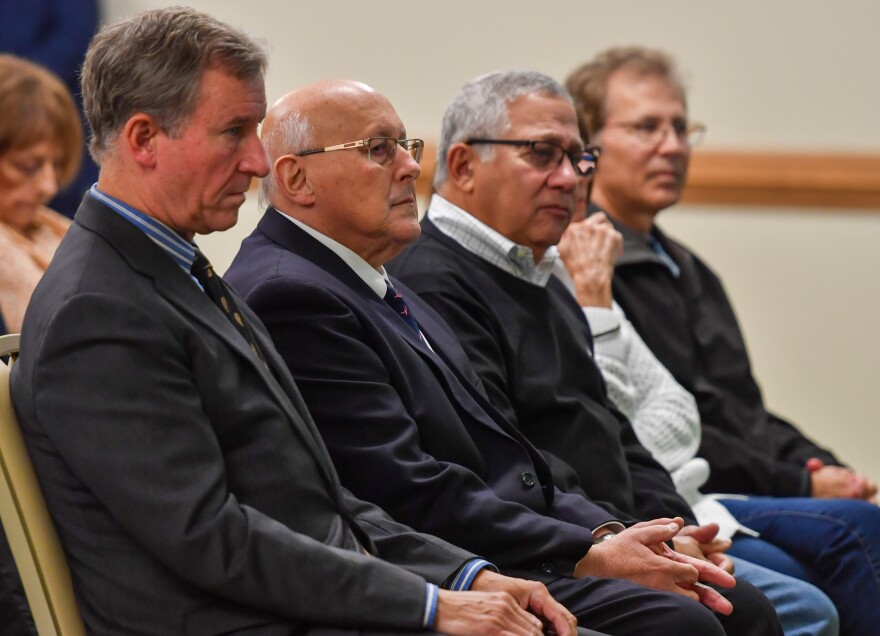For Elinor Bitton-Bariach and her family, red alert sirens were an all-too-familiar part of their daily lives in Israel's Kfar Aza kibbutz.
When the alarms sounded at 6:29 a.m. on the morning of Oct. 7, 2023, Bitton-Bariach and her family sprang into action.
"You need to understand that once the siren comes on, we have less than 15 seconds to run for our lives," she told a hushed audience at the Sidney and Pauline Friedman Jewish Community Center Monday night in Kingston.
It was the beginning of a 22-hour ordeal in which Bitton-Bariach and her family crouched in fear inside a safe room while terrorists murdered their friends and neighbors.
"Horrible things happened. They did horrible things, and they were well trained," she said, speaking on the one year anniversary of Hamas terrorist attacks that killed more than 1,100 people, mostly civilians.
Members of the militant Palestinian nationalist and Islamist group crossed the border into southern Israel from Gaza, attacking small towns and people attending a music festival. Nearly 100 hostages taken that day remain in captivity.
Bitton-Bariach is one of several survivors participating in speaking engagements organized by Faces of October 7th, a nonprofit group seeking to make their stories known and combat antisemitism and misinformation about the attacks.

"We want to let everybody know that this is what happened," Bitton-Bariach said.
In sight of Gaza
Her family's home, in a communal village of about 700 people, was just 1.7 kilometers — about a mile — east of Gaza. Images shown during her presentation illustrated how the city's skyline was visible from the kibbutz, beyond rings of fencing.
Bitton-Bariach, her husband, and their three teenagers were drowsy that Saturday morning, having arrived home from a family gathering just four hours earlier. The day was a religious holiday, Simchat Torah.
Still, they knew the drill: Rush to their safe room, shut the door, and wait for the sirens to end. Israelis are trained to treat every alert as a genuine threat.
"We've never, ever underestimated those," Bitton-Bariach said.
But they didn't lock the door. They were expecting an imminent rocket attack — often the alarms are followed within seconds by a blast — followed, hopefully, by a return to normalcy.
It didn't happen. Instead, the alarm just kept wailing.
"We were thinking, who forgot to push the stop button," Bitton-Bariach said.
'This is not a regular alarm'
At 6:34 a.m., the sirens finally stopped. Bitton-Bariach headed to the bathroom. Her sense of relief was soon shattered.
"My husband was running to the kitchen and closing all the windows, locking the doors, and he came back with three big, huge kitchen knives," she recalled.
"He looked at me and said, 'Elinor, we are in a different situation."
Outside, he had heard men shouting "Allahu Akbar." The Arabic phrase means "God is the greatest." He did not tell her that immediately.
"He said, 'This is not a regular alarm,'" Bitton-Bariach recalled.

They briefly discussed whether to stay locked down or attempt to flee.
At 6:38 a.m. the sirens resumed. The family rushed back to their safe room, locked the door, and waited.
Official channels had yet to break the news that a widespread terrorist attack was underway. At 7:05 a.m. residents were warned to stay inside, but with no indication as to why.
'They knew exactly what they were doing'
The family turned to WhatsApp community message boards, which were alive with chatter.
By 7:15 a.m., they learned from neighbors that about 400 attackers had swarmed into their community.
"The population of Kfar Aza (was) about 670 people, maybe 700 altogether. So 400 terrorists — armed, well-trained terrorists? We had no chance," Bitton-Bariach said.
Already, there were reports of 20 to 30 killings, she said.
"In the morning, when everybody's still half asleep, nobody knew what to do," she said of the victims.
While the kibbutz was fenced, its perimeter was easily breached by attackers who approached from four directions.
"They knew exactly what they were doing," Bitton-Bariach said.
Kfar Aza was one of the most hard-hit communities. The end result: 67 dead, 19 kidnapped, eight still hospitalized, she said.

'They're going to murder us'
Hour after hour, as reports of murders and kidnappings came in via WhatsApp, the family sat silent, communicating by text or gestures.
Outside the safe room, they could hear shouting, explosions and gunfire. Attackers were in their home and on their roof, and occasionally banged on the room's metal window.
"They wanted us to know they knew we were there," Bitton-Bariach said.
And then a personal message: Bitton-Bariach's daughter learned a friend she cared deeply for had thrown himself on a grenade to save his fiancee.
"Then she started sobbing, and I asked her to be quiet," Bitton-Bariach said. "And after a few seconds, I went to her, I shut her mouth, and I whispered in her ears, 'if you're not going to be quiet, they're going to murder us.'"
"Then she started sobbing, and I asked her to be quiet," Bitton-Bariach said. "And after a few seconds, I went to her, I shut her mouth, and I whispered in her ears, 'if you're not going to be quiet, they're going to murder us.'"
It's a moment etched into her memory.
"And ever since, every morning, I'm asking for her forgiveness because this is not something that a mother should tell her daughter," Bitton-Bariach said.
But she also knew the risk was real: Reports continued to flow of people being burned alive in their homes, or dragged away into captivity.
'Open up, it's the IDF'
Focused on silent survival, the family lost track of time.
At 10:30 p.m., there came a knock on the window: "Open up, it's the IDF," a voice said.
Hungry, tired and scared, Bitton-Bariach and her family weren't immediately ready to believe the Israeli Defense Force, as the army is known, was on the other side of the window. Some neighbors had reported Hamas terrorists making the same claim — and clad in IDF uniforms — as they burst into homes to kill their residents.
A neighbor's voice assured them it was safe to open the door. They did so, to find soldiers swarming the house in search of terrorists.
"At 10:30, we thought we smelled freedom," Bitton-Bariach said. Instead, soldiers quickly shoved the family back into the safe room, warning that they were still clearing terrorists from the kibbutz.
"It took them almost five more hours to get back to us, and those were the longest five hours ever," she said.
'You have five minutes to pack'
The middle of the night: Another knock. A voice saying he had come to rescue the family.
Again, they froze. Only after some back-and-forth interrogation did they feel comfortable with the young voice's answers, after he gave his name and described being part of a scout troop in Tel Aviv, Bitton-Bariach's hometown.
"We decided to open the door. And this was a time when they told us, 'You have five minutes to pack,'" Bitton-Bariach recalled.
That was compounded by another devastating revelation: Everyone was being evacuated on foot.
Bitton-Bariach and her family were among about 100 residents marched away from the kibbutz by the IDF.
Soldiers told them to look straight ahead. Human nature dictated otherwise.
"You automatically look to the right and look to the left. And we saw many bodies on the ground," she said. Despite wearing IDF uniforms, many were not Israeli soldiers, she learned.
"So, you know, going out between the bodies, with that horrible smell, and watching my kibbutz burning down, it was a horrible scene," she said.
Hoping to rebuild
The family was briefly relocated to another kibbutz, and from there to a hotel where they are still living, with the teens traveling 90 minutes each way to attend their own school for a sense of normalcy.
Bitton-Bariach said she hopes they will be moved to a temporary home soon — and eventually, back home to Kfar Aza.
"It's very, very hard for all of us, but we're hoping that as a community, we'll be able to get stronger again, and we will be able to rebuild our community," she said.

Expressions of support
The audience included members of area Jewish and Christian religious congregations, as well as U.S. Rep. Matt Cartwright and Wilkes-Barre Mayor George Brown, both expressing support for the region's Jewish community.
"It was an act of cruelty and savagery of a kind that shook us to our very core," Cartwright (D-Moosic) said of the attacks.
"I want you to know that you and Israel are not alone. I stand with you. The United States Congress stands with you, and the American people stand with you," Cartwright said. "In the face of such unfathomable tragedy, our solidarity with the people of Israel must be unwavering."
"I voted for aid for Israel and will continue to support the resources necessary to protect our strongest ally in the Middle East," he said.
Rabbi Larry Kaplan, spiritual leader of Temple Israel in Wilkes-Barre, expressed thanks for that support at a time when antisemitism has been on the rise.
"We feel that support here in Wilkes-Barre every time that we walk into our temples, our congregations, our synagogues," Kaplan said.
"Unfortunately, we have to walk past armed guards and police in order to do so, especially over our holidays. But we do press on, and our prayers are so important," he said.
Brown said the city stands with its Jewish community.
"We want to make sure that you're safe. We want to make sure that your temples are safe," the mayor said. "We're here for you. I'm here for you, and God bless."
Security guards and armed police officers were present at the JCC for Monday's event in Kingston.

'It can happen everywhere'
In a brief interview after her presentation, Bitton-Bariach spoke about being the daughter of a holocaust survivor, as well as some of the parallels between her mother's experience and Oct. 7.
Her mother, who is 85 and lives in Tel Aviv, was hidden from the Nazis by Christians during World War II, and ended up living in an orphanage before later emigrating to Israel.
While safe during the Oct. 7 attacks, she has been confronting the realities of what her daughter experienced.
"She's strong, but it's very hard for her, and I think she's realizing every once in a while more details and processing more details of what happened," Bitton-Bariach said.
She reflected on how her mother was in hiding for years during the war.
"It's horrible what we went through. But it was 22 hours or 30 at the most," Bitton-Bariach said. "They were there for days and months and years."
Bitton-Bariach's message to American audiences was one of thanks, but also caution.
"Israel is a democracy. Israel is in the Western world, and it happened to us," she said of the Oct. 7 attacks.
"So if it happened in Israel, it can happen everywhere."


